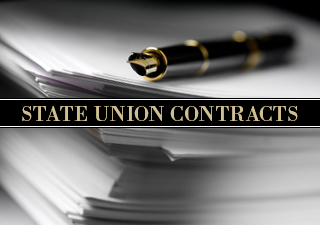Fact Sheet

Pennsylvania’s State Union Contracts
Background
On June 30, 2011, 15 of the state’s 19 government union contracts expire, with two more expiring in August. These 19 public sector unions represent 62,271 state employees, whose compensation from taxpayers exceeds $4.6 billion.
The average wage, including benefits, for state government employees has risen by 45% over the past 10 years, more than double the rate of inflation (22%). Private sector wages have risen only 34%.
In order to address the continuing economic recession and loss of federal stimulus money, as well as spending growth that has exceeded the rate of inflation and long-term fiscal imbalances, policymakers must scrutinize government employee compensation and bargaining powers. The following analysis and recommendations will provide a guideline for reforming government employment and aligning public sector compensation with that of the private sector.
Union Contract Provisions
Contracts for the various state government unions are very similar in their core provisions. This patterned bargaining allows the unions to work as a team, or in tandem, during contract negotiations. The American Federation of State, County, and Municipal Employees (AFSCME) contract is usually the first (or master) agreement as it covers the most (nearly 33,000) government workers.
Some of the main provisions concerning wages, benefits, and key provisions in the contracts include:
- Fair Share Fees. State government employees who do not wish to join the union are forced to forfeit a portion of their paychecks called an “agency” or “fair share” fee. This fee—usually about 80% of membership dues—purportedly covers only the individual’s share of collective bargaining costs. Fee payers do not have voting privileges and are ineligible for legal representation and professional liability insurance from the union. Of course, all employment laws and protections apply to all employees regardless of their union status.
- Dues Deduction. Employees never receive their union dues or fair share fees. Through contract provisions, Pennsylvania’s government unions mandate that the state withhold dues and fair share fees from the worker’s paycheck. The state then writes a check to each union for the amount withheld from employee paychecks. In total, the commonwealth withheld and paid more than $33 million in dues and more than $7 million in fair share fees to these 19 unions in 2010.
- Political Action Contributions. Five of the contracts require the state to collect (via paycheck withholding) voluntary contributions to the union’s Political Action Committee (PAC). These PACs can then contribute directly to the campaigns of political candidates. No other private or political organization enjoys such financial privileges.
- Maintenance of Membership. If present in their contract, this provision prevents unionized workers from leaving the union for the duration of the contract. Only the United Food and Commercial Workers (UFCW), the government liquor store union, currently has this provision.
- Holidays. State union contracts guarantee an average of 11 holidays per year. Fifteen union contracts give their workers the Monday or Friday off should the holiday fall on a weekend, and two unions, the UFCW and the Pennsylvania State Troopers Association (PSTA), even have both the primary and general election days as holidays.
- Vacation. Most state government union members receive paid vacation days ranging from 2.7 to 10% of days worked, depending on years in service. Fourteen of the unions earn sick days at a rate of 5% of days worked. In addition, most unionized employees earn two to four paid personal leave days per year. Overall, state government employees average 41.2 days off per year.
- Health Care. Employees in state government unions contribute 3% of their salary to their health coverage. Using the average state worker salary, this represents a comprehensive family health care plan for $123 per month. In comparison, the average private sector employee typically pays a percentage of the health care costs rather than wages-sharing in the burden of rising health care costs or more generous health care benefits. According to the Kaiser Family Foundation, the average employee in Pennsylvania pays $231 per month for a family plan.
- Wage Scale. Unionized state employees are compensated based on job classification and number of years in service. Wage scales in union contracts provide annual increases in pay regardless of job performance. Union contracts also specify the annual increases for a positions and seniority increases. In the current union contracts, wages increased by 3%, 3%, and 4% the last three years for most positions, and seniority increases (raises for employees staying in their job) were 2% each year. The average total compensation for government workers in Pennsylvania has risen to $73,994, a full $22,760 more than the average private sector total compensation of $51,234.
- Overtime. The commonwealth spends more than $173 million on overtime costs for state government employees.
- Miscellaneous provisions. The AFSCME contract mandates “the employer will not require employees to continuously perform repetitive keyboard motions at a VDT in excess of two consecutive hours,” and to break up repetitive work, “the employer will attempt to provide 15 minutes of alternative work with the employee’s job classification or give a break period.” The PSCOA contract awards one “Stress Day” of paid leave per year for each employee of five years or longer. The UFCW has a clause in their contract that forces any future liquor store employer to honor the union’s contract in the case of privatization.